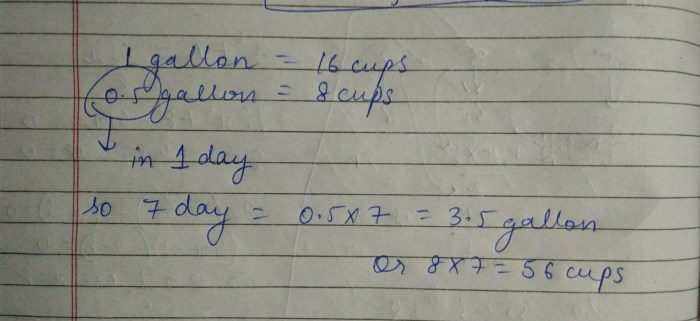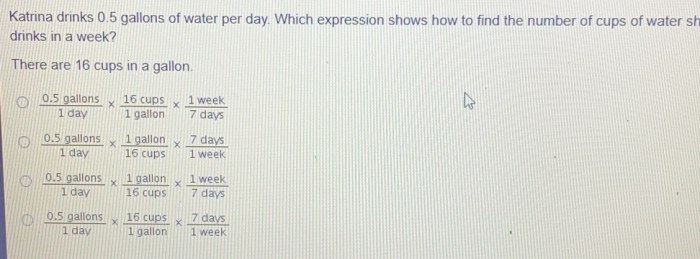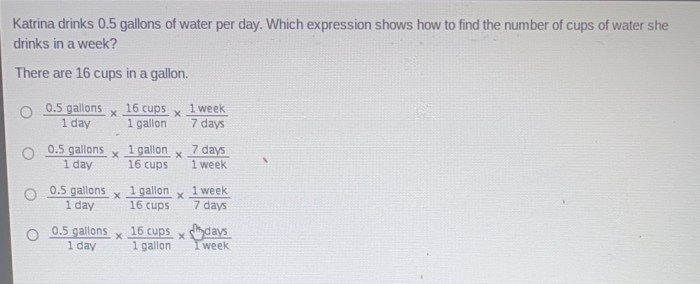Katrina drinks 0.5 gallons of water daily, showcasing the significance of adequate hydration for overall health. Water consumption plays a crucial role in maintaining bodily functions, supporting physical and mental well-being, and potentially mitigating various health conditions.
This comprehensive guide explores the importance of water consumption, its health benefits, and practical strategies for maintaining proper hydration levels. Discover how water supports bodily functions, enhances physical performance, and contributes to a balanced diet.
Water Consumption
Water is essential for overall health and well-being. It comprises around 60% of the human body and plays a crucial role in various bodily functions.
Recommended Daily Water Intake
- The recommended daily water intake varies depending on factors such as age, weight, activity level, and climate.
- Generally, adults are advised to consume around 8-10 glasses of water per day.
- This amount can be adjusted based on individual needs and circumstances.
Tips for Increasing Water Intake
- Carry a reusable water bottle and refill it throughout the day.
- Add fruits or vegetables to water for flavor and added nutrients.
- Drink a glass of water before and after meals.
- Choose water over sugary drinks like soda and juice.
Health Benefits of Water

Adequate water intake is associated with numerous health benefits, including:
Supports Bodily Functions
- Water helps regulate body temperature, lubricate joints, and transport nutrients.
- It also plays a crucial role in waste elimination and maintaining electrolyte balance.
Improves Physical and Mental Well-being
- Water consumption can enhance energy levels, reduce fatigue, and improve cognitive function.
- It can also support weight management and promote healthy skin.
Water and Hydration
Hydration refers to the body’s water balance. Maintaining proper hydration is crucial for overall health.
Signs and Symptoms of Dehydration
- Thirst
- Dry mouth
- Fatigue
- Headaches
- Dark-colored urine
Maintaining Proper Hydration Levels
- Drink water regularly throughout the day, especially during exercise and hot weather.
- Monitor urine color as an indicator of hydration.
- Consider using a hydration tracker or app to monitor water intake.
Water and Exercise
Water consumption is crucial before, during, and after exercise.
Regulates Body Temperature
- Water helps regulate body temperature by sweating.
- Staying hydrated during exercise prevents overheating and heat-related illnesses.
Prevents Dehydration
- Exercise increases fluid loss through sweating.
- Replenishing fluids by drinking water prevents dehydration and maintains optimal performance.
Recommendations for Staying Hydrated
- Drink 2-3 glasses of water 2-3 hours before exercise.
- Sip water regularly during exercise, especially in hot or humid conditions.
- Replace lost fluids after exercise with water or sports drinks.
Water and Diet: Katrina Drinks 0.5 Gallons Of Water

Water is an essential component of a healthy diet.
Reduces Calorie Intake
- Drinking water before meals can help reduce calorie intake by promoting satiety.
- Water can also help flush out toxins and support digestion.
Promotes Satiety
- Water can fill the stomach and create a feeling of fullness.
- This can help reduce food cravings and overeating.
Water-Rich Foods
- Fruits and vegetables, such as watermelon, strawberries, and cucumbers, are high in water content.
- These foods can contribute to daily water intake and provide essential nutrients.
Water and Health Conditions

Water consumption can impact various health conditions.
Kidney Stones, Katrina drinks 0.5 gallons of water
- Adequate water intake can help prevent kidney stones by diluting urine and reducing the risk of crystallization.
Urinary Tract Infections
- Water helps flush out bacteria from the urinary tract, reducing the risk of infections.
High Blood Pressure
- Water can help reduce blood pressure by maintaining proper hydration and reducing the workload on the heart.
Water Quality and Safety
Water quality is crucial for health.
Sources of Water
- Tap water
- Bottled water
- Well water
Potential Contaminants
- Bacteria
- Chemicals
- Heavy metals
Ensuring Clean and Safe Drinking Water
- Boil water if its safety is in doubt.
- Use a water filter or purification system.
- Follow local water quality guidelines and recommendations.
FAQ Summary
Why is water consumption important?
Water comprises approximately 60% of the human body and is essential for regulating body temperature, transporting nutrients, and removing waste products.
What are the recommended daily water intake guidelines?
The recommended daily water intake varies based on factors such as age, activity level, and climate, but generally ranges from 8 to 10 glasses of water per day.
How can I increase my water intake throughout the day?
Carry a reusable water bottle, set reminders to drink water regularly, and incorporate water-rich fruits and vegetables into your diet.